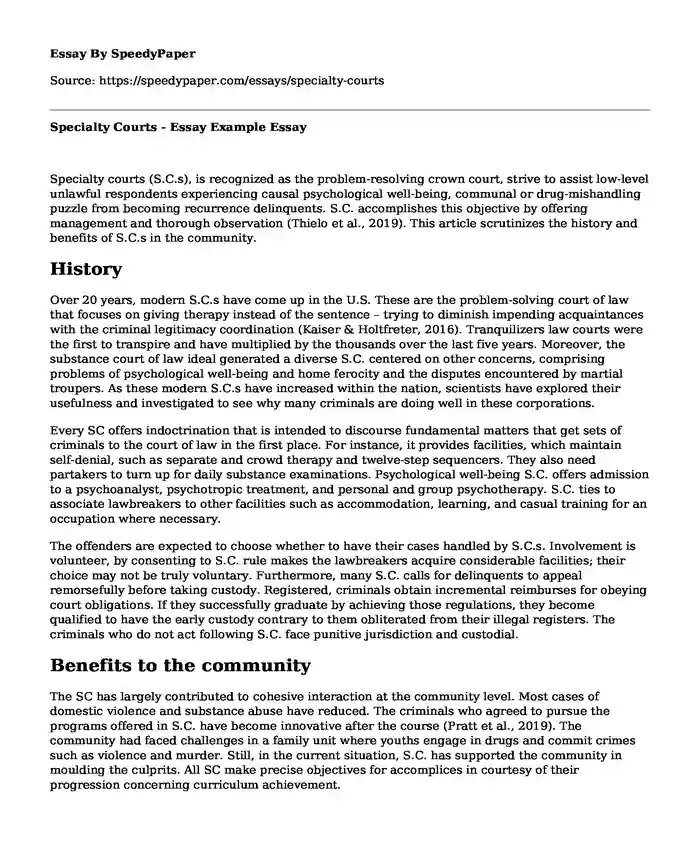
| Type of paper: | Essay |
| Categories: | United States Court system Criminal justice Behavior |
| Pages: | 3 |
| Wordcount: | 632 words |
Specialty courts (S.C.s), is recognized as the problem-resolving crown court, strive to assist low-level unlawful respondents experiencing causal psychological well-being, communal or drug-mishandling puzzle from becoming recurrence delinquents. S.C. accomplishes this objective by offering management and thorough observation (Thielo et al., 2019). This article scrutinizes the history and benefits of S.C.s in the community.
History
Over 20 years, modern S.C.s have come up in the U.S. These are the problem-solving court of law that focuses on giving therapy instead of the sentence – trying to diminish impending acquaintances with the criminal legitimacy coordination (Kaiser & Holtfreter, 2016). Tranquilizers law courts were the first to transpire and have multiplied by the thousands over the last five years. Moreover, the substance court of law ideal generated a diverse S.C. centered on other concerns, comprising problems of psychological well-being and home ferocity and the disputes encountered by martial troupers. As these modern S.C.s have increased within the nation, scientists have explored their usefulness and investigated to see why many criminals are doing well in these corporations.
Every SC offers indoctrination that is intended to discourse fundamental matters that get sets of criminals to the court of law in the first place. For instance, it provides facilities, which maintain self-denial, such as separate and crowd therapy and twelve-step sequencers. They also need partakers to turn up for daily substance examinations. Psychological well-being S.C. offers admission to a psychoanalyst, psychotropic treatment, and personal and group psychotherapy. S.C. ties to associate lawbreakers to other facilities such as accommodation, learning, and casual training for an occupation where necessary.
The offenders are expected to choose whether to have their cases handled by S.C.s. Involvement is volunteer, by consenting to S.C. rule makes the lawbreakers acquire considerable facilities; their choice may not be truly voluntary. Furthermore, many S.C. calls for delinquents to appeal remorsefully before taking custody. Registered, criminals obtain incremental reimburses for obeying court obligations. If they successfully graduate by achieving those regulations, they become qualified to have the early custody contrary to them obliterated from their illegal registers. The criminals who do not act following S.C. face punitive jurisdiction and custodial.
Benefits to the community
The SC has largely contributed to cohesive interaction at the community level. Most cases of domestic violence and substance abuse have reduced. The criminals who agreed to pursue the programs offered in S.C. have become innovative after the course (Pratt et al., 2019). The community had faced challenges in a family unit where youths engage in drugs and commit crimes such as violence and murder. Still, in the current situation, S.C. has supported the community in moulding the culprits. All SC make precise objectives for accomplices in courtesy of their progression concerning curriculum achievement.
The criminals are summoned to law court frequently for condition trials to enable magistrates to scrutinize the continuing relations among the offenders and magistrate's court crewmembers. The S.C.s have influenced the lives of criminals and the community they belong to. Among these affirmative touches is the significant decline of imprisonment charges and re-offence rates of S.C. accomplices. Many communities are facing youth development; the culprits complete the course and become innovative. For example, carpentry, masonry, tailoring, bakery, and ICT, among others are ongoing training because of S.C.s programs.
References
Kaiser, K. A., & Holtfreter, K. (2016). An integrated theory of specialized court programs: Using procedural justice and therapeutic jurisprudence to promote offender compliance and rehabilitation.
Criminal Justice and Behavior, 43(1), 45-62. https://journals.sagepub.com/doi/abs/10.1177/0093854815609642?casa_token=ZKbyn5u9Ih4AAAAA:2x8HlIcNLNj4_PmzipAWBI6KYxjp7p49oNjpC2QljHGzJBz148xpvzPQ1EX8sKrFrfdkk2qS1I9bGw
Pratt, T. C., & Turanovic, J. J. (2019). A criminological fly in the ointment: speciality courts and the generality of deviance. Victims & Offenders, 14(3), 375-386.
https://www.tandfonline.com/doi/abs/10.1080/15564886.2019.1595247Thielo, A. J., Cullen, F. T., Burton, A. L., Moon, M. M., & Burton, Jr, V. S. (2019). Prisons or problem-solving: Does the public support speciality courts?
Victims & Offenders, 14(3), 267-282. https://www.tandfonline.com/doi/abs/10.1080/15564886.2019.1595243
Cite this page
Specialty Courts - Essay Example. (2023, Sep 25). Retrieved from https://speedypaper.net/essays/specialty-courts
Request Removal
If you are the original author of this essay and no longer wish to have it published on the SpeedyPaper website, please click below to request its removal:
- Human Rights Violation Essay Example
- Compare and Contrast Essay on Literature Pieces
- History of Gun Laws in Colorado - Essay Sample for Students
- Article Review Essay Sample: Employee Involvement on Organizational Productivity
- Spirituality in the Workplace - Literature Review Paper Sample
- Free Essay Analyzing Washington's Farewell Address
- Free Paper Sample on Juvenile Offenders Should not Face the Death Penalty
Popular categories




